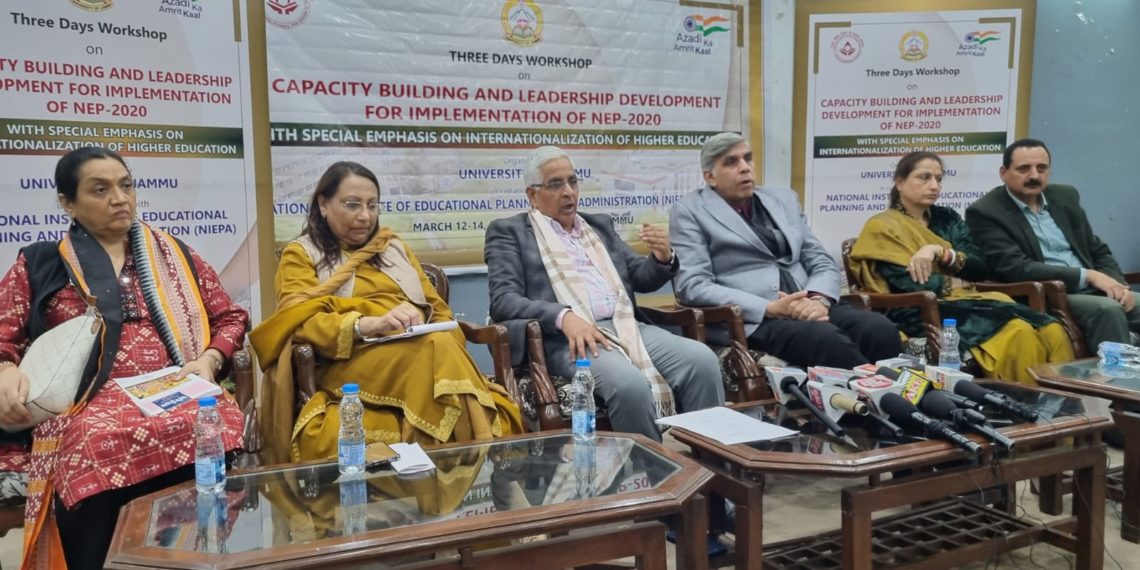Jammu, March 11: In a significant stride towards transforming India’s educational landscape, the University of Jammu, in collaboration with the National Institute of Educational Planning and Administration, is set to host a three-day workshop centered on “Capacity Building in Leadership Development of Academic Administrators and Principals for NEP-2020 Implementation.” This workshop, with a special focus on internationalizing higher education, represents a significant leap towards aligning Indian higher education with global benchmarks.
University of Jammu has been selected as the nodal university for the familiarization, Sensitization and Capacity building of academicians, administrators and other stakeholders for the effective implementation of the NEP 2020.
During a curtain-raiser press conference, Prof. Dinesh Singh, Vice Chairperson Higher Education council, Govt. of JK UT and Chancellor, Kumara Mangalam University spoke at length about how NEP is going to create a Knowledge Economy that is indispensable for sustained high economic performance of any country. He further spoke of the need to connect the students with NEP and enable them to enjoy the freedom that it offers.
Vice-Chancellor, University of Jammu, Prof Umesh Rai while speaking on the occasion, stressed the critical importance of revisiting curriculum design in light of NEP-2020. He proudly announced that the Union Territory of Jammu and Kashmir, led by the University of Jammu, is at the forefront of NEP-2020 implementation, showcasing the region’s unwavering dedication to delivering quality education. The workshop will delve into policy implementation, especially in universities where youth enrollment is at its peak.
Prof. Rai emphasized the shift towards offering maximum courses online, providing students with flexibility in choosing courses or subjects not available in their colleges.
Dean Academic Affairs and Convener of the three day workshop, Prof. Anju Bhasin gave a detailed overview of the workshop sharing that around 250 participants have registered and there would be 35 speakers in ten sessions spread over 3 days.
As India proudly holds the world’s second-largest education system, witnessing a remarkable 27 percent surge in higher education participation, the emphasis is now on more than just reform – it’s about a comprehensive overhaul. The commitment is to reshape higher education, offering students top-tier curricula and institutions that can compete on a global stage. The National Education Policy 2020 (NEP-2020) serves as the guiding light in this transformative journey. The JKUT was the first among all the Union Territories that implemented NEP in the undergraduate course.
Embedded within it is the shift towards offering maximum courses online, to ensure ease of access even in the most remote parts of the region, access to knowledge beyond the geographical boundaries, and providing students with flexibility in choosing courses or subjects not available in their colleges.
The University of Jammu, being a substantial multi-disciplinary institution and a regional hub for higher education, is uniquely positioned to spearhead discussions on multidisciplinary education, curricular reforms, and research-oriented undergraduate training. The institution’s innovative “Design your Degree” framework, deeply imbibed curricular reforms, serves as the foundation for global academic exchanges.
Themed “Internationalization of Higher Education,” the workshop brings together key stakeholders – university leaders, administrators, and academics – to deliberate on aligning university systems with the vision of NEP-2020. Distinguished participants include Ambassadors of the Indian government, renowned resource persons, university Vice-Chancellors, Deans, College Principals, and academics, collectively assessing NEP-2020 implementation.
The program objectives encompass implementing NEP-2020 recommendations at the institutional level, reflecting on internationalization strategies, developing and implementing institutional development plans, promoting multidisciplinary education, ensuring holistic development, embracing blended learning, and initiating skill-based education.
Participants will delve into themes such as multidisciplinary and holistic education, internationalization of higher education, institutional development plans, digital initiatives in education, collaborative tools, teacher education, school quality issues, social responsibility, community engagement, organizing internships, research promotion, and industry-institution linkages.
The workshop not only equips participants with knowledge but also empowers them to apply their competencies for the enhancement of their respective institutions. The sessions, featuring presentations, discussions, group work, and case study overviews, offer abundant opportunities for communication and knowledge sharing.
Those present on the occasion included Prof. Meena Sharma, Dean Planning and Development, Prof. Neelu Rohmetra, Dean Research Studies, Prof. Sandeep Pandita, Director MMTTC and Co-Convener of the workshop , Prof. Manisha Priyam, Dept. of Education Policy, NIEPA, New Delhi.


